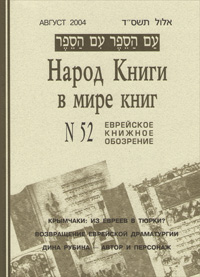The People of the Book in the World of Books is a Russian bimonthly publication for serious readers with Jewish interests. Our English website includes only the summaries of the published articles. To access the complete text of them, please visit the Russian version of this website.

|
||
|
This issue of the magazine includes:
• Polemics: From Judaism to Tengrianity. Once Again about the Spiritual Search among Contemporary Crimean Karaites and Krimchaks
In the conditions of the Russian Empire the Karaites managed to separate themselves from the Jews and were protected from the humiliating restrictions of Russia's anti-Jewish legislation. In order to secure this status in the 20th century, their leaders started to claim that Karaites were a special Turkish people that had nothing in common with Jews. After the collapse of the USSR, the Krimchaks, a small Turkish-speaking ethnic group that lives on the Crimean Peninsula and traditionally belonged to Judaism, also tried to assert this claim. Now certain ideologists that represent both the Crimean Karaites and the Krimchaks claim that the basis of their spiritual heritage is not Judaism but ancient paganism, in particular, the cult of Turkish divinity Tengri. The magazine continues to publish polemic articles that try to analyze the reasons why the Karaite and Krimchak leaders want to be "excluded from the Jews."
• Synopses: Four New Editions
Brief reviews present the anthology of Yiddish plays in Russian translations Half a Century of Yiddish Theater, 1876–1926 (Moscow, 2003); Decline of Königsberg (St. Petersburg, 2004), the memoirs of Holocaust survivor, Michael Wieck, translated from German; the controversial novel Syndicate by Dina Rubina (Moscow, 2004) that describes with irony and sarcasm two years of the author's work as shaliakh of the Jewish Agency in Russia's capital; an analysis of the positive and negative sides of the new multi-media edition of the Russian-language Jewish Encyclopedia, originally published in 1908–1913 and now reissued on 4 CD-ROMs.
• Jewish Calendar of Significant Dates: September–October 2004
• Bibliography: 130 New Books |


